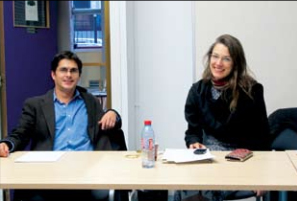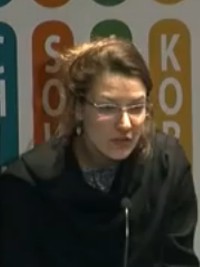
Centre of Jaina Studies Newsletter: SOAS - University of London
Held in Lille, France from June to November 2012, the international seminar 'Debate, Argumentation and Theory of Knowledge in Classical India: The Import of Jainism' was co-organized by Shahid Rahman (University of Lille), Peter Flügel (SOAS) and MarieHélène Gorisse (Ghent University). It was sponsored by the European Institute of Social Sciences and Humanities within the framework of their project 'Argumentation, Decision, Action', aimed at supporting research on argumentation (What does it mean to persuade? What are the historical and cultural forms which argumentation takes? How do the uses of argumentation influence power relationships?). The goal of this seminar was to tackle the following question: What benefits would there be to a theory of argumentation that takes into account the specific insights of Jainism?
The first step of this seminar was to present some chosen features of Jainism to an audience comprised of scholars of Jainism and scholars of logic and theories of argumentation. Piotr Balcerowicz (University of Warsaw) addressed this in his talk 'Ontology and Epistemology of the Jainas: Dealing with Complex Reality'. After a presentation of the Jaina theory of the complex character of reality (anekāntavāda), according to which everything in the world is linked by an infinite number of relations, Balcerowicz explained that on account of this, in order to be able to speak unambiguously, one has to delimit a precise context within this complex net. Three Jaina theories in particular address this issue: (i) the theory of angles of analysis (nikṣepavāda) gives the rules of application of a word. (ii) the theory of viewpoints (nayavāda) gives the rules of application of a sentence.[1] (iii) and the theory of modes of predication (saptabhaṅgī) gives a means to stress the type of predicate at stake in a given sentence. This is a crucial step to undertake in a theory granting that affirming a given property ascription entails the negation of a range of other property ascriptions.
Continuing on from this, the second step in this seminar was to investigate the insights such a theory could bring to our conceptions of argumentation.
(I) Context and Ontological Presuppositions
Balcerowicz's talk made it clear that Jaina theorists are highly interested in the question: 'How can we know that it is the case that two interlocutors are speaking about the same thing?' First establishing the means in order to answer this question is a crucial preliminary step for any good theory of argumentation. In fact, the absence of an agreement concerning the epistemological frame of reference would end any attempt at argumentation, because of the lack of a common frame of interpretation of the sentences. Furthermore, if what is at stake in the debate concerns ontology, then the issues concerning interpretation cannot be dealt with in a theoretical framework of considering the reference of the words. With this in mind, in a previously published article, Clerbout, Gorisse and Rahman developed the first steps towards a formal reconstruction of a dialogue system expressing the theory of viewpoints, in which only semantic notions defined in an argumentative framework and not in a reference theoryare used.[2]

Presentation of Piotr Balcerowicz (standing)
(II) Debate and Pragmatism
In this respect, it becomes useful to work on the pragmatic conditions of communication, and in particular on Grice's definition of meaning for a given speaker. More precisely, Grice is working on a set of rules or maxims that one has to take into consideration when the disputants in a debate cannot agree on ontology. From this, one gains a definition of a portion of the meaning that is robust in relation to the change of viewpoint, as well as a deontology of debate.
This sensitivity to pragmatism in Jainism was already manifest in the attempt to reconstruct not only common meanings, but also common implicatures. Peter Flügel observed this characteristic of Jainism when he wrote: 'The analysis of the uses of language in the Jaina scriptures shares many characteristics with the approach of universal pragmatics in contemporary philosophy'.[3] As the second speaker in this seminar, Flügel showed in his talk 'Norms of Interaction and Language Usage in Jaina Logic and Argumentation' that a Jaina answer to the delicate question of the establishment of the norms of interaction was to propose a hierarchy of the norms of language, as well as a hierarchy of the sources of legitimation of these norms, on the basis of ethical and religious criteria. In consequence, the contextual rules that regulate the production of a discourse in Jainism are implemented in a framework not limited to rational debate.
(III) Universalism
A last characteristic under consideration was the universality of such an ideal debate. The third speaker, Jonardon Ganeri (University of Sussex; Monash University, Australia), proposed an interesting new interpretation of Jainism in his talk 'Well-Ordered Science and the Logic of Jaina Epistemic Culture'.[4] After having developed a definition of a type of science as a system of public knowledge, Ganeri made it clear that the goal of such a science would make a broader consensus possible, and that the methodology of such a science would be deliberation. Jaina theory seems exceptionally well-targeted to these two key constituents of an ideal conversation. Firstly, the theory of viewpoints can be seen as the (exhaustive) classification of levels of correct descriptions that a human agent can make on the world. Secondly, the theory of modes of predication can be seen as the (exhaustive) list of types of end-states that a process of ideal deliberation might have (complete consensus, partial consensus, disagreement, etc.).
Each lecture was followed by one hour of discussion.

Jonardon Ganeri and Marie-Hélène Gorisse
The exchange of ideas between Indologists, philosophers and logicians revealed the richness of the field, and the potential fruitfulness of further research. For the time being, one can retain from these discussions three main points from a theory of argumentation that takes into account the specific insights of Jainism: (i) the concrete argumentative situation serves as a basis for the semantic notions at stake, i.e. the meaning of the words is defined in relation to the way one can use the words within a debate; (ii) the theory should be able to draw a distinction between different types of context and to establish a frame within which one can compare them; (iii) the theory of assertion should furnish the structure for the meta-theory of the argumentative system.
P.Balcerowicz. "Some Remarks on the Naya Method". In Essays in Jaina Philosophy and Religion: Proceedings of the International Seminar on Jainism "Aspects of Jainism" in Warsaw University 8-9th Sept.2000, Delhi: Motilal Banarsidass, 2003, pp. 37-67.
N. Clerbout, M., H. Gorisse, S. Rahman "Context-sensitivity in Jain Strategic Dialogues: A Dialogical Study of Siddharṣigani's Commentary on the Handbook of Logic", Journal of Philosophical Logic, Vol. 40, No. 5, 2011, pp. 633-662
P. Flügel, "Power and Insight in Jaina Discourse" in Logic and Belief in Indian Philosophy. Warsaw Indological Studies 3, edited by P. Balcerowicz, Delhi: Motilal Banarsidas, 2010, pp. 85-217.
 Dr. Marie-Hélène Gorisse
Dr. Marie-Hélène Gorisse